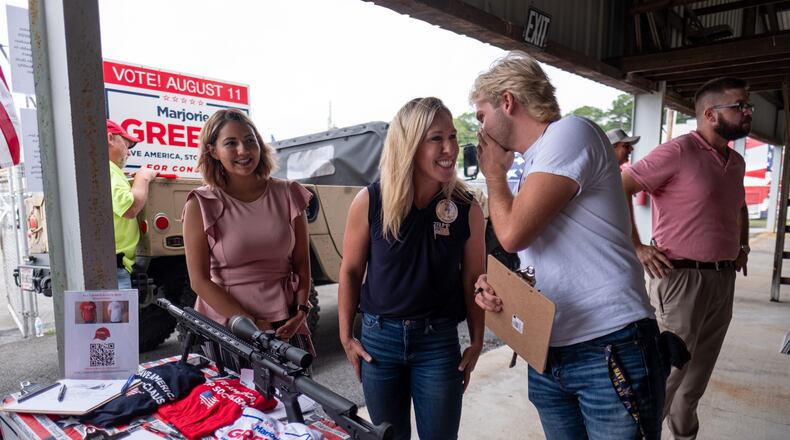Kevin Van Ausdal’s uphill campaign for a U.S. House seat ended with a knock on his door late Wednesday while he was cooking dinner.
It was a deputy sheriff, there to serve him divorce papers from his wife. As part of the proceedings, he would have to vacate the home they shared.
After flirting with renting a nearby place, the Democrat decided to move in with family in Indiana – and abruptly abandon his congressional bid for an open seat against Republican Marjorie Taylor Greene.
Van Ausdal didn’t initially want to share those details, which were provided with his approval Friday by his campaign aide, Michael McGraw. But rumors of threats and coercion had surfaced on social media after he cited “personal and family reasons” for his surprise decision to drop out.
“We told him there’s no wiggle room here,” said McGraw, the candidate’s principal consultant. “We are deeply saddened because the campaign was taking off in a lot of ways.”
Van Ausdal was a longshot candidate at best. The northwest Georgia district he was competing to represent is overwhelmingly Republican. Outgoing U.S. Rep. Tom Graves captured more than three-quarters of the vote over a little-known Democrat in 2018.
But Greene’s runoff victory brought a surge of attention to his bid. Greene moved to the district weeks after Graves announced he wouldn’t stand for another term, and won the GOP nod despite a history of racist and xenophobic remarks and support for the baseless QAnon conspiracy.
An IT specialist with no political experience, Van Ausdal quickly benefited from support from Democrats outraged by Greene’s hateful comments. (Just in the last week, she asserted that wearing masks is “emasculating” and featured a picture of herself on a now-deleted Facebook post holding a rifle next to images of three Democratic congresswomen.)
An uptick in donations helped the Democrat hire McGraw and other staffers to beef up his operation, and he touted an internal poll this week that put him at 40% in the race, though few party insiders found it credible.
But the campaign unraveled as his marriage fell apart. McGraw said Van Ausdal initially explored ways to keep running from Indiana, but his staff pushed back.
It’s not illegal for U.S. House candidates to live outside their districts, but the Constitution stipulates they must live in the same state where they are running.
“We said that automatically triggers the end of the campaign,” McGraw said of Van Ausdal’s decision to move to Indiana. “He doesn’t know the ins and outs of federal election law. And he wasn’t thinking about the constitutional requirements for office.”
The timing of the resignation puts Democrats in a bind. Because it’s within 60 days of the election, state law appears to restrict Democrats from appointing a successor. The Secretary of State’s office said he can withdraw his candidacy -- but that “he cannot be replaced” on the ballot.
Local Democrats are still making contingency plans in case of another twist. So is Van Ausdal’s former campaign team.
“To a certain extent, we haven’t thrown in the towel. We’re still waiting to see what happens,” said McGraw. “But winning this race is a tall order even for an experienced politico.”
About the Author
The Latest
Featured





